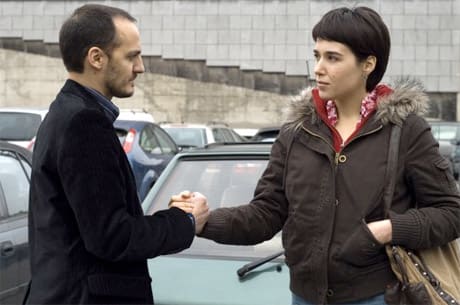It could be argued that it was Belgian sibling duo the Dardennes brothers that popularized this new prevailing trend towards social realism in international cinema. That is, socially conscious, character-based stories told with an attention to detail for the mundane movements of its characters.
Two Palme D'Ors later and the brothers are back in the realm of social realism with some minor tinkering to the formula, which, unfortunately, results in their least successful offering.
Admittedly I had to read the press release synopsis to clarify some plot points and help it make sense. Lorna (Arta Dobroshi) is an Albanian gal living in Belgium who seems to have been set up to live with Claudy (L'Enfant's Jeremie Renier), a junkie trying to go cold turkey from heroin addiction. Things are not what they seem though, as Lorna is actually married to Sokol, who still lives in Albania, but is waiting for Lorna to get her citizenship papers to bring him into the country. Underground schemer Fabio (Fabrizio Rongione) seems to be Lorna's agent, brokering this deal. When a Russian mobster comes into the picture looking to gain citizenship, Lorna is sold for cold hard cash to the Russian for marriage. Meanwhile, as Fabio is pulling Lorna's strings, she gradually develops a conscience and an awareness of the immorality of her actions and looks for a way out.
The Dardennes have trouble balancing a back-story, which requires more exposition than they've ever had to give, with the fact that exposition runs counter to their "in the moment" dogmatic style. The scale leans more towards confusion than genre integrity, as most of the above synopsis and explanations of who's who are left for us to deduce from the implied actions of the characters. We've never told who Lorna is or why she's with Claudy or why she's with a junkie or why she falls for him or why Fabio wants Lorna to marry the Russian. I wouldn't even have known Lorna was Albanian if not for the synopsis.
I'm sure these explanations are in the film somewhere, and maybe I'm the nave for missing them, but the plot feels like a crutch for the filmmakers, who really just want us to laser in on Ms. Dobroshi and Lorna, as they've done before with their other great performances. And indeed, Dobroshi has a wonderful face and nuanced mannerisms, which bring across the internal moral conflict she struggles with.
Sometimes we need more than a facial expression or a nuanced mannerism to keep us going; we desperately want to know what's in Lorna's head and even if we guess it, there's value in the spoken word. And somewhere an important message about the commoditization of Eastern European women and the depths to which many will sink to escape to a life they think they need to have is unfortunately lost.
After a number of these Dardenne street dramas expectations are high, either to better or equal the ones before it, or show us something we haven't seen. Lorna's Silence accomplishes neither and is thus a disappointment.
(E1)Two Palme D'Ors later and the brothers are back in the realm of social realism with some minor tinkering to the formula, which, unfortunately, results in their least successful offering.
Admittedly I had to read the press release synopsis to clarify some plot points and help it make sense. Lorna (Arta Dobroshi) is an Albanian gal living in Belgium who seems to have been set up to live with Claudy (L'Enfant's Jeremie Renier), a junkie trying to go cold turkey from heroin addiction. Things are not what they seem though, as Lorna is actually married to Sokol, who still lives in Albania, but is waiting for Lorna to get her citizenship papers to bring him into the country. Underground schemer Fabio (Fabrizio Rongione) seems to be Lorna's agent, brokering this deal. When a Russian mobster comes into the picture looking to gain citizenship, Lorna is sold for cold hard cash to the Russian for marriage. Meanwhile, as Fabio is pulling Lorna's strings, she gradually develops a conscience and an awareness of the immorality of her actions and looks for a way out.
The Dardennes have trouble balancing a back-story, which requires more exposition than they've ever had to give, with the fact that exposition runs counter to their "in the moment" dogmatic style. The scale leans more towards confusion than genre integrity, as most of the above synopsis and explanations of who's who are left for us to deduce from the implied actions of the characters. We've never told who Lorna is or why she's with Claudy or why she's with a junkie or why she falls for him or why Fabio wants Lorna to marry the Russian. I wouldn't even have known Lorna was Albanian if not for the synopsis.
I'm sure these explanations are in the film somewhere, and maybe I'm the nave for missing them, but the plot feels like a crutch for the filmmakers, who really just want us to laser in on Ms. Dobroshi and Lorna, as they've done before with their other great performances. And indeed, Dobroshi has a wonderful face and nuanced mannerisms, which bring across the internal moral conflict she struggles with.
Sometimes we need more than a facial expression or a nuanced mannerism to keep us going; we desperately want to know what's in Lorna's head and even if we guess it, there's value in the spoken word. And somewhere an important message about the commoditization of Eastern European women and the depths to which many will sink to escape to a life they think they need to have is unfortunately lost.
After a number of these Dardenne street dramas expectations are high, either to better or equal the ones before it, or show us something we haven't seen. Lorna's Silence accomplishes neither and is thus a disappointment.




